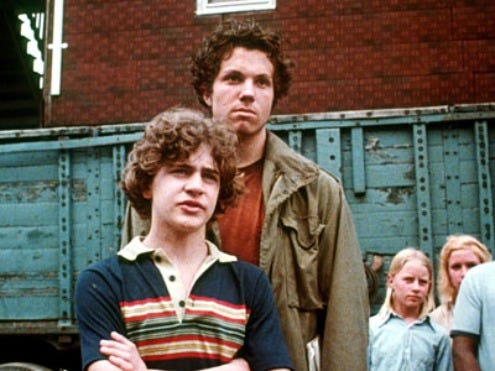My Bodyguard (1980)

It's always amazing what movies stick with you and why. I watched "My Bodyguard" when I was 10 years old and I don't think I saw it again in the ensuing 30 years, until now. And yet this film has stayed with me and I've thought about it often.
It might not surprise you to learn that I was bullied when I was in school. (What? A geeky film critic bullied?) I'm not proud to say that I stopped taking the bus and began riding my bike to junior high school to avoid a particularly nasty cretin who liked to sit behind people and flick earlobes with a force that seemed not possible for 14-year-old fingers.
Of course, one good smack in the nose would've silenced him, but it is the nature of the bullied to have blinders to obvious solutions. One lives in a constant state of fear, and the consequences of standing up seem much more dire than quietly taking the abuse and hoping the bully will grow bored and shift his attention to a juicier target.
Fear is the coin of the realm for bullies, one they know how to leverage well.
In virtually all contemporary iterations of cinematic bullies, they are simply victims who themselves have been pushed around and pass on the cycle of abuse to others. I think this is usually poppycock in comparison to real life. Bullies bully because they like doing it. They enjoy the power and being the center of attention.
Perhaps my bias is why I've always liked "My Bodyguard," since the bully is never granted a redemptive moment. He's simply a jerk and will continue being one until someone puts a stop to it.
The bully, Melvin Moody, was memorably played by Matt Dillon in his very first screen role. Adam Baldwin, playing the title character, also made his film debut. Ditto for Joan Cusack, who has a small but memorable role as a geeky girl with a crush on Moody, and Jennifer Beals, who had an uncredited bit part as one of Moody's hangers-on.
Chris Makepeace was the veteran of the group, having appeared in "Meatballs" a year earlier. "My Bodyguard" more or less marked the height of his career. With his curly mop of hair and big, wet eyes, Makepeace prompted me to make (derisive) comparisons to Shia LaBeouf early in his career, and I think the resemblance, both physically and the range of roles LaBeouf has pulled off, still holds.
One thing about "My Bodyguard" that sets it apart from most movies starring teenagers that followed: They're actually played by teen actors. Dillon and Makepeace would both turn 16 the year the film came out; Beals was 17; Cusack, 18. Even Baldwin, playing scary troubled high school sophomore Ricky Linderman, who looms over his classmates like a surly giant, was 18.
Nowadays, filmmakers prefer actors comfortably past their pimples-and-awkwardness years.
The film was directed by Tony Bill, in his first outing, from an original screenplay by Alan Ormsby. It's set in Chicago and was shot there. Despite my fondness for the notion of bullies getting their comeuppance, that's not the part of the movie that lingered for me.
The Moody plot is disposed within a little over a half-hour, with the bully refusing to take on Linderman after Clifford Peache (Makepeace), the put-upon newcomer, convinces the hulking outcast to be his bodyguard. Moody returns for the final act, with an older tough brought on as his bodyguard to run off Linderman, which succeeds for awhile until the final fisticuffs — first between Linderman and the thug, and then (improbably but satisfyingly) between Clifford and Moody.
No, the middle third is where this movie's heart lies. It's the slowly growing bond between these two lonely boys, both pushed into rebel roles they never sought. Linderman was content to stand outside the school's social structure, and the last thing Clifford wanted was to become the symbol of an uprising against Moody, who'd been extorting protection money from half the school.
Although he lives in comfort and gets picked up and dropped off by a limousine, Clifford is not rich: Just the son of the manager of a swanky hotel manger, played by Martin Mull. His grandmother is played by Ruth Gordon, and she's a troublemaking sexpot who likes to pick up older gentlemen in the hotel lounge. It's the sort of horny grandma role that would inevitably be played by Betty White if the film was made today.
But there's some soul and depth to the old gal. While she's reading Linderman's palm, Clifford notices some scars on his wrist; it wasn't until years later I realized these were the result of an implied attempted suicide. Linderman, his shell of impervious indifference pierced, pulls back his hand. Gordon sternly holds on: "You're among friends here, you're among friends."
This is when we realize Linderman is not the tough guy he's been made out to be. He's shattered by the accidental shooting of his kid brother a year earlier, and his mask of belligerence hides a frightened youngster who hates himself.
In this light, it's not surprising that Linderman backs down from Moody's hired thug later on — even allowing him to smash up the motorcycle he spent years restoring, with a little help from Clifford. It may well be that Linderman had never been in a fight before. He'd relied on his reputation and his size to keep the likes of Moody at bay, but he, too, reacts to a bully with freezing fear.
The bodyguard who's never thrown a punch: What an audacious concept. I think that's why I keep mentally coming back to "My Bodyguard: It continually reveals new layers of truth about what it's really like to be a teenager, whether an outcast, a bully or the bullied.
4 Yaps



